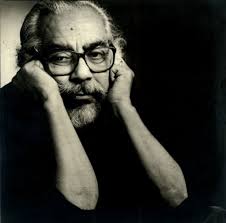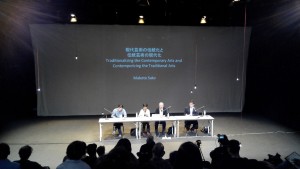9 students from the Theatre Studies programme attended a conference on Malaysian theatre practitioner and theorist Krishen Jit held on 9-11 January 2015 in Kuala Lumpur. Below is a write-up on the conference:
. . . . . . The ellipsis is a marker of an unfinished sentence that communicates unfinished thoughts and points towards hesitance. It could equally indicate a need to take a deliberate pause and, in some contexts, conjures a sense of longing. In many ways, Unfinished Business: Conference on Krishen Jit’s Performance Practice and Contemporary Malaysian Theatre can be seen as elliptical in its attempt, after ten years since his passing, to take a deliberate pause and incite conversation about Krishen Jit’s legacy and his impact on contemporary Malaysian theatre. It was organized by Five Arts Centre, which Krishen Jit had a hand in founding, and held at the Kuala Lumpur Performing Arts Centre. The conference provided a rare opportunity for theatre practitioners, academics, students and long-time friends from both local and overseas communities to gather in order to commemorate and contemplate the current moment in relation to the legacy he left behind.
As elliptical as Krishen Jit, the conference in a similar vein resuscitated and provoked many conversations – all of which were left unfinished – in line with theme of the conference. A privileged group of 9 students from the Theatre Studies programme were given this unique opportunity of entering into this unfinished conversation about a theatre maker who had greatly influenced contemporary theatre making in Malaysia and Singapore.
The conference was well-balanced with keynote speeches, panel presentations, theatrical performances, story dialogues and workshops, which crystallized Krishen Jit’s work, not only as a theatre-maker but also as an academic. He possessed an insatiable hunger for the rigorous development of both theatre practice and theory in the region, where his voracious appetite extended far beyond the art towards the dining table. The conference reiterated Krishen Jit’s delicate obsession with food, which was fondly remembered by friends and colleagues alike. As such, the conference started off with an impressive performance by the Singapore-based Malaysian artists Huzir Sulaiman and Claire Wong titled Carrot/Pantun/Dance: The Show of a Post-Show Dialogue recounting how Krishen Jit taught them to “cook” caramelized carrots, of course, amongst many other important things in life.
Foregrounded by this hilarious yet thought-provoking start, the second day of the conference saw various speakers interrogating contemporary performance in the region – art historian T. K. Sabapathy spoke about “Krishen Jit and the Contemporary in Southeast Asia”; a group of artists including Ong Keng Sen, Leow Puay Tin and Ray Langenbach presented papers along the theme of “Contemporary Business: Construction, Reconstruction, Deconstruction”; members of Five Arts Centre Marion D’Cruz and Chee Sek Thim shared about “Practicing… De/Re/Constructions”; theatre veterans Joe Hasham, Faridah Merican, Kee Thuan Chye and Chin San Sooi spoke about “Collaborating with Krishen.” As the conference unfolded, it became very apparent that Krishen Jit had left much unfinished discussion, work and relationships behind. The speakers spoke fondly of their intimate collaborations with him and related how this had impacted contemporary theatre practice in Singapore and Malaysia. They spoke of his unfinished experimentation with form and content in the 80s and 90s that had laid the foundations for the deeper questioning of tradition, culture and history. Tying in the complex postmodern and postcolonial experience that is coupled with our current epoch of intensifying globalisation and cosmopolitanism, the subject of negotiating cultures and relationships in theatre practice and the development of the Arts in East and Southeast Asia was broached with much academic rigour and purpose. The day ended with performances by Jo Kukathas and Ivan Heng, which were both based on the productions they had created with Krishen Jit. Embodying the notions of deconstruction and reconstruction of identity, Ivan Heng treated the audience to a sterling restaging of Emily on Emerald Hill, dressed in a suit as opposed to his 1999 debut, which was directed by Jit.
The third and final day opened up conversations about traditional-contemporary discourse as well as the process of experimentation and intercultural collaboration. The speakers included Japanese theatre director and Jit’s long time collaborator Makoto Sato who spoke about “Traditionalising the Contemporary and Contemporarizing the Traditional Arts”. Mohd Anis Md Nor, Soon Choon Mee, Tan Sooi Beng likewise gave presentations that were related to the theme, “Experimental Business: Interdisciplinary, Intercultural, Interconnection.” Following which, Janet Pillai and Mark Teh of Five Arts Centre dealt with “Practicing Intersections” whilst Malaysian artists Jillian Ooi, Anne James, Nam Ron and Zahim Albakri covered “Experimenting with Krishen . . . .” These discussions and dialogues surfaced the intricacies and complexities of collaboration across different fields, cultures and art forms. In many ways, Krishen Jit was very much ahead of his time in using theatre to experiment. In essence, his body of work traversed new frontiers and pushed boundaries. Yet, with any pioneer, delving into unchartered territories brings its fair share of success and failure and we, as younger students and practitioners, are left with Krishen Jit’s unfinished art. His bold attempts to engage in interracial casting and cross-disciplinary performances in Family: A Visual Performance Event (1998) and Monkey Bussiness (2005) were but the heralds of deeper explorations of hybridity and interactions that are the conditions of our postmodern ere. Krishen Jit’s work remains unfinished simply because we can only continue to unroot, unravel and understand it and hence when the conference drew to a close, the important question of “what is next?” was raised. Issues ranging from democratizing the rehearsal space, to censorship in the arts, to development of the younger generation were articulated with passion and gusto, but without resolution or conclusion. This inconclusive ending of the dialogue was a stark reminder of the amount of unfinished business that Krishen Jit left behind. It was also a call to introspection for the theatre practitioner, academic and younger generation to take up the issues and business that have been left unfinished. (Contributed by Ken Takiguchi.)

